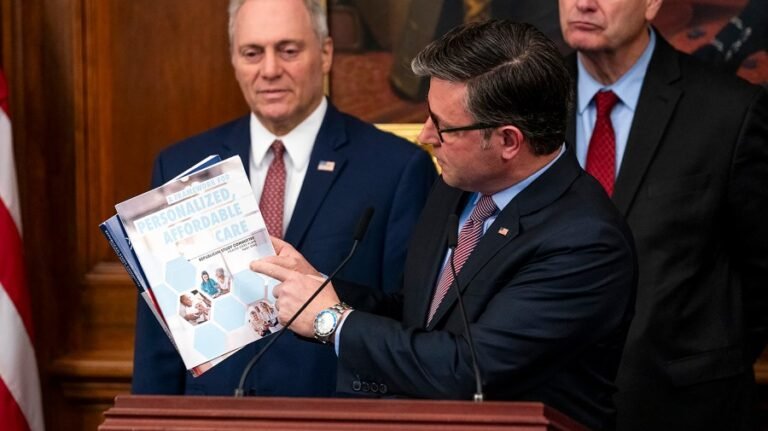
President Trump’s out-of-the-blue federal pardons for Rudy Giuliani, Sidney Powell and dozens of others who were part of his effort to stay in power after losing the 2020 election comes alongside the administration’s accelerating prosecution of Obama officials who Trump says tried to keep him from winning in 2016.
Maybe that’s a claim of equivalence: that the folks who tried to get then-Vice President Mike Pence to steal the election in the Senate in 2021 were only doing what had been done to Trump by Democrats like James Clapper and John Brennan when they investigated Russian efforts to interfere in 2016.
Why else would Trump give federal pardons to people who had not been charged with federal crimes? The week after your party just took an off-year pasting for, among other things, having the wrong priorities seems like a highly unusual moment to grant symbolic pardons of wildly controversial figures.
They won’t alter or undo any of the state prosecutions of Giuliani & Co., who are certainly safe from the Trump Justice Department. It makes even less sense than former President Biden’s eleventh hour pardons of a slate of Trump foes. So why now, unless there’s some at least symbolic connection to lawfare retribution?
I’m asking in service of a more important question: How does this all end?
I don’t mean these specific cases or even the other legal battles of the Trump presidency — not even the very real concerns around the 2028 presidential election. How does all of this end? How do we stop politics from eating us alive?
The comforting thought is that it will probably, like other times of paranoia and persecution, burn itself out. The horrors of both the Woodrow Wilson era and Joe McCarthy’s brief reign expired when it became clear that they were losers with voters.
So maybe one day in the not-too-distant future, politicians will conclude that mercy is more appealing than justice and Americans will do what we have many times before and chuck old conflicts down the memory hole.
But we should also at least consider another possibility.
You may have read about Mark Grebner, the Michigan data scientist who says he has a “political score” for every resident of the Great Lakes State and that on a scale of 0-100 can state the likelihood that any Michiganian will vote Republican or Democratic. He recently took The New York Times through the rolls of celebrities (Eminem, 58 percent Democratic), business leaders (William Clay Ford Jr., 86 percent Republican) and even a mass murderer who killed four at a Mormon temple (you’ll have to look it up yourself if you just have to know).
What makes Grebner’s scores stand out isn’t the information he mines. Everything he’s working with is available to the public from voting records and other datasets. What makes Grebner unique is that he doesn’t always charge to share his findings. He’s been working on his project for decades — since before the political data revolution of 2000 — and seems to enjoy the periodic attention.
Indeed, the big firms that have political scores for you and almost every member of the voting public have deeper, better, more expensive data than Grebner. They just don’t give it away. Instead, they sell your scores to campaigns and PACs looking to motivate you to vote or, sometimes more importantly, not to vote.
It won’t surprise you to hear that data collection and the scoring of citizens is getting more invasive and more intense. Political data has typically lagged behind corporate efforts, and for good reason. Your vote is valuable, but only every two years or so. If the people who sell you coffee pods, track pants or pickup trucks can get a bead on you and your habits, that could be the making of a lifetime customer. With the rapid growth of artificial intelligence, though, the cost of building detailed voter files is dropping rapidly.
Look at how quickly news organizations were able to determine the ages of early voters in New York’s mayoral election last week. Work that once would have taken days to achieve could easily be accomplished in hours as the city got better at data management and the organizations can turn robots loose on the numbers.
It’s not in the interest of political data firms to make their voter scores public. That’s their business. But they will soon have lots of new competition from data miners, and lots of new data to mine.
The Trump administration is working on a project to create comprehensive files on all Americans, in which the information about your income, marital status, legal problems, family life, military service, job and maybe even medical information goes into one big fat file as opposed to the current system, in which the information about you is scattered across different agencies. That’s inefficient for the government, but also inefficient for people trying to figure you out.
The fully dystopian imaginary future is of a “political score” that sounds an awful lot like the “social credit score” used by the Chinese government to help suppress dissent. Looking for a government job or a grant? Admission to a school that gets government money? First, check the score.
But you don’t even have to go full techno-authoritarian to imagine some bad outcomes. One day soon, it will be possible for anyone to know the likely partisanship of almost any other citizen. That’s potent knowledge in a society in which guilt or innocence and shame or glory increasingly seem to depend on the political affiliations of the perpetrators.
Your judgment of whether Giuliani and Clapper were either misguided or malicious probably depends mostly on whether you are aligned with them politically. So what if you could know the politics of everyone you met? Unlike societies ripped apart by religion, race or geography, we could just do it with a score.
Stirewalt is the politics editor for The Hill, veteran campaign and elections journalist and best-selling author of books about American political history.


